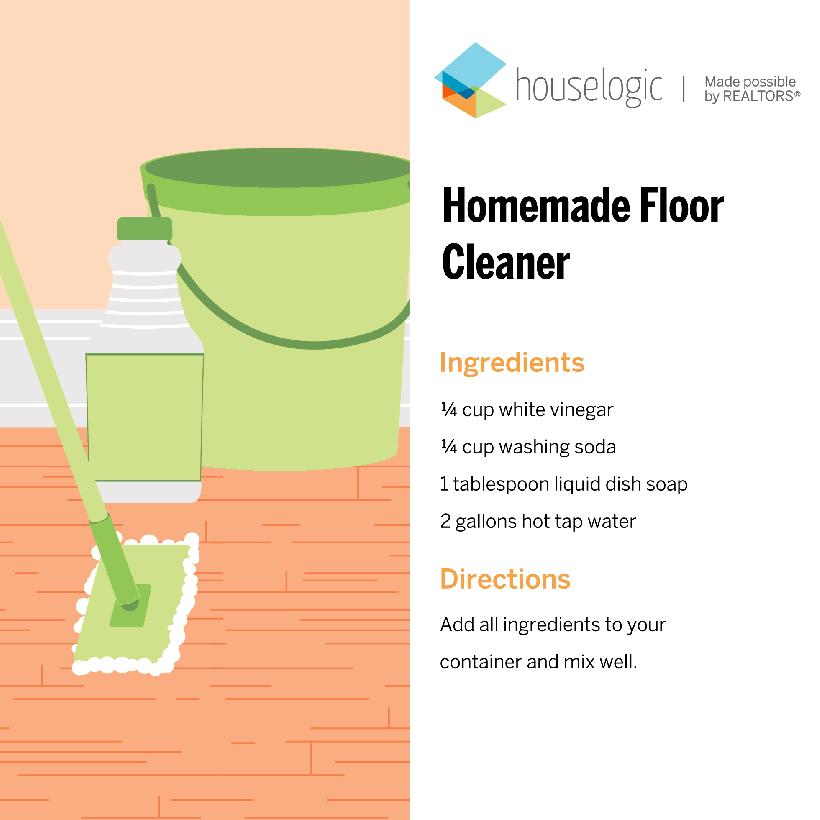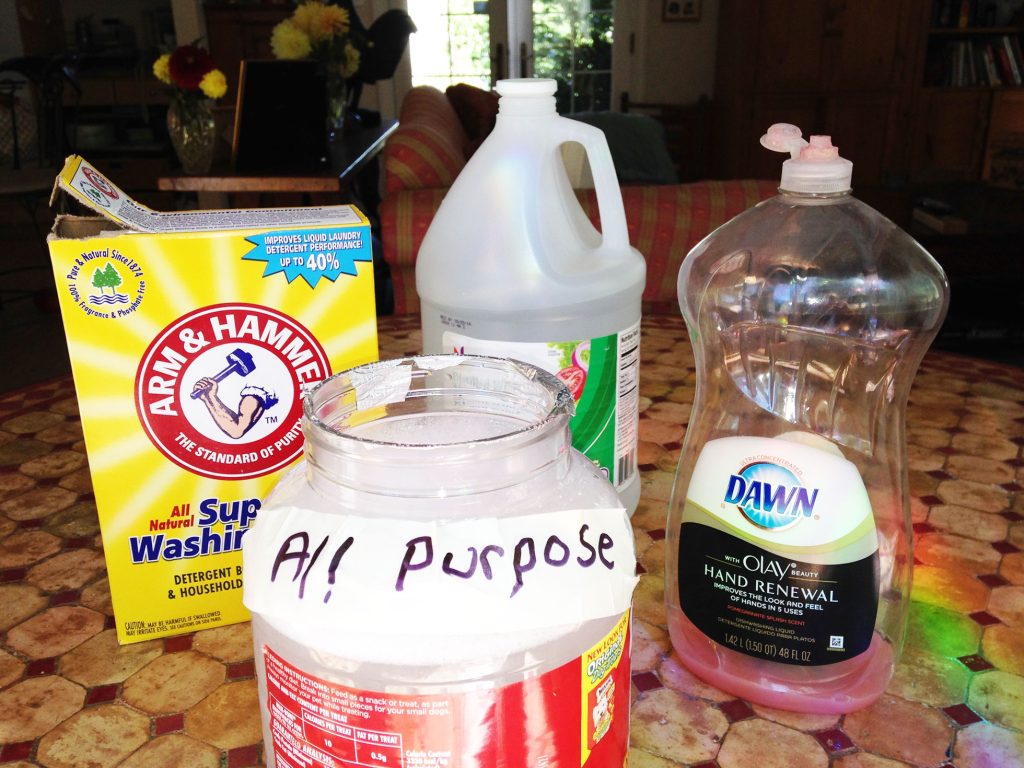To make your own floor cleaner, combine water with vinegar and a few drops of essential oil. Choose a spray bottle for easy application and shake well before each use.
Creating a homemade floor cleaner is an effective, eco-friendly way to keep your floors shining. DIY solutions not only cut down on the use of harsh chemicals but can also be kinder to your wallet. By using simple ingredients like distilled white vinegar, essential oils for fragrance, and water, you can concoct a non-toxic cleaner that’s safe for most surfaces.
This sustainable approach to cleaning is gaining popularity among homeowners who prefer natural alternatives. With just a few steps, anyone can mix a batch of environmentally friendly cleaner that tackles grime and leaves floors with a streak-free finish. Start with this hassle-free recipe, and your floors will look spotless while you contribute to a healthier living space and planet.

Credit: www.mom4real.com
The Benefits Of Homemade Floor Cleaners
Creating your own floor cleaner has multiple benefits. Homemade recipes are gentler on the environment, due to the absence of harsh chemicals. They reduce the introduction of toxins into your home, making it safer for your family and pets. Not only are these solutions better for the planet, but they also save you money. Store-bought cleaners can be expensive, whereas DIY cleaners often use common, affordable ingredients.
| Eco-Friendly Benefits | Cost-Effective Advantages |
|---|---|
| No harmful chemicals released | Lower expenses than store-bought |
| Safe for animals and children | Uses economical, everyday items |
| Preserves indoor air quality | Reduces the need for multiple products |
By opting for homemade cleaners, you invest in health. You also ensure that your cleaning practices are sustainable. Both your wallet and the Earth will thank you!

Credit: www.houselogic.com
Essential Ingredients To Have On Hand
Making a DIY floor cleaner is simple with the right ingredients. Natural cleansers like vinegar and baking soda are key. These items safely cut through grime. Your floors will shine without using harsh chemicals.
Don’t forget about disinfectants and deodorizers. Lemon juice has natural antibacterial properties. It leaves a fresh scent. Alcohol, like vodka, can kill germs on contact. A mixture of these can tackle most cleaning challenges.
| Natural Cleansers | Disinfectants | Deodorizers |
|---|---|---|
| Vinegar | Alcohol (Vodka) | Lemon |
| Baking Soda |
Recipes For Different Floor Types
Homemade hardwood floor cleaner needs just natural ingredients. Combine 1/2 cup of white vinegar with a gallon of warm water. To protect the wood, do not oversaturate the mop – just dampen it. This mix removes dirt without damaging the hardwood. For a nice scent, add a few drops of essential oil.
To create a gentle tile cleaner, mix 1/2 cup of baking soda into 2 gallons of water. Stir until it dissolves. Use this solution with a soft mop for a shiny and clean surface. Always rinse with clear water after cleaning to remove any residue.
Laminate floor requires a special touch. Combine 3 parts water to 1 part vinegar in a spray bottle. Add a squirt of liquid dish soap. Spray lightly on the floor and use a microfiber mop. This keeps laminate streak-free and looking new.
Mixing Your Own Solution
Mixing your own floor cleaning solution is easy. You need some simple ingredients from your home. Vinegar and baking soda are great for many types of floors. Use essential oils to give a fresh scent.
Begin by combining 2 cups of warm water with ½ cup of white vinegar. Next, add ¼ cup of rubbing alcohol for disinfection. Include 3 drops of liquid dish soap but avoid those with bleach.
Stir in 5-10 drops of essential oil like lavender or lemon. Always mix well. Test on a small floor area first. Use a spray bottle for easy application. Remember, shake well before each use.
Here are some tips for the perfect mix:
- Measure ingredients correctly for balance.
- Use distilled water to avoid streaks.
- Label your homemade cleaner clearly.
- Keep the solution out of children’s reach.
Application Techniques For Maximum Efficacy
Applying your homemade floor cleaner correctly ensures a clean and damage-free floor. Use a mop or cloth that is not too wet. This will prevent water from seeping into the cracks.
A mop with a flat head is ideal for an even application of the cleaner. Swipe the mop in an “S” pattern. This covers the floor well without missing spots. For hardwood floors, work in the direction of the grain. This method offers extra protection to the wood.
Never pour cleaner directly on the floor. Instead, lightly spray or dampen the mop head. This avoids creating puddles that can damage the floor. Direct contact with strong cleaners can cause discoloration or warping. Even natural cleaners can harm if used in excess. So, always spread lightly and evenly.

Credit: yoursandmineareours.com
Storage And Safety Tips
Storing your homemade floor cleaner properly is crucial. Choose a cool, dark spot like a cabinet or pantry. Use a clean, labeled container to prevent confusion. A tight seal keeps the cleaner effective for longer. Check the cleaner monthly. Look for changes in color or smell. Replace it if anything seems off to ensure optimal cleaning performance.
Ensuring the safety of kids and pets is vital. Never leave cleaning products within their reach. A high shelf or a locked cabinet is best. All containers should be child-proof. Even natural cleaners can be harmful if ingested. Familiarize everyone in the home with emergency procedures, just in case. For pets, consider a pet-safe cleaner as an extra precaution. Keep all cleaning products away from their food and water bowls.
Frequently Asked Questions Of How To Make Your Own Floor Cleaner
What Ingredients Are In Homemade Floor Cleaners?
Most homemade floor cleaners contain a combination of water, vinegar, dish soap, and essential oils for natural disinfection and fragrance.
Can Diy Floor Cleaner Disinfect Surfaces?
Yes, DIY floor cleaners with ingredients like vinegar or rubbing alcohol can effectively disinfect surfaces and eliminate bacteria.
How Often Should I Use Natural Floor Cleaners?
Use natural floor cleaners routinely, ideally once a week, to maintain clean floors without damaging them with harsh chemicals.
Is Making Floor Cleaner Cheaper Than Buying?
Homemade floor cleaners are typically more cost-effective than store-bought alternatives, using inexpensive and readily available ingredients.
Conclusion
Crafting your own floor cleaner is both eco-friendly and budget-wise. With simple ingredients, your floors can shine without harsh chemicals. Embrace the homemade approach and enjoy pristine, toxin-free surfaces. Start mixing and mopping—it’s that straightforward. For a cleaner home, DIY is the way to go!

